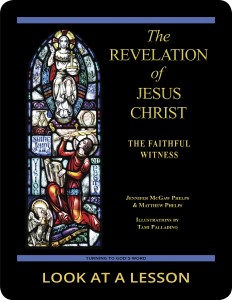woe
 Woe is a word that makes a frequent appearance in the Bible. In the twenty-third chapter in the Book of Jeremiah (NABRE), the LORD wishes woe on those misleading his people. In the twenty-third chapter of the Gospel According to Matthew (NABRE), Jesus repeatedly condemns the scribes and Pharisees, each condemnation beginning with the word “woe.” From context, it’s clear that woe is something we’d rather not receive, but beyond that, it’s not so clear what exactly this ill-wishing is.
Woe is a word that makes a frequent appearance in the Bible. In the twenty-third chapter in the Book of Jeremiah (NABRE), the LORD wishes woe on those misleading his people. In the twenty-third chapter of the Gospel According to Matthew (NABRE), Jesus repeatedly condemns the scribes and Pharisees, each condemnation beginning with the word “woe.” From context, it’s clear that woe is something we’d rather not receive, but beyond that, it’s not so clear what exactly this ill-wishing is.
The Greek word οὐαί (ouai) and the Hebrew הוֹי (howy) are both onomotopeic—they rely on a sound that is made rather than a root suggesting specific ill fortune. Such usages put into words sentiments of pain, anger, or disgust so fundamental that initially they were uttered as sounds rather than words. It’s a guttural and emotional response that in these cases highlights the extremity of God’s outrage and feeling of horror about the situation.
What do you think God could find particularly offensive about leading others astray? How can we avoid woe in our own lives?
related topics: judgment; vengeance
you also may like our study of the book of Revelation
 The Revelation of Jesus Christ: The Faithful Witness, a 23-lesson Catholic Bible study with an imprimatur, examines ways in which our traditional Christian view of heaven is built on Hebrew apocalyptic visions recorded in the Old Testament. This recently revised study includes maps and additional commentary and takes a close look at the role of the prophets in present-day Christianity. Illustrations by Tami Palladino depict the often-misunderstood images in the book of Revelation. Click on the book’s cover to view a sample lesson.
The Revelation of Jesus Christ: The Faithful Witness, a 23-lesson Catholic Bible study with an imprimatur, examines ways in which our traditional Christian view of heaven is built on Hebrew apocalyptic visions recorded in the Old Testament. This recently revised study includes maps and additional commentary and takes a close look at the role of the prophets in present-day Christianity. Illustrations by Tami Palladino depict the often-misunderstood images in the book of Revelation. Click on the book’s cover to view a sample lesson.
 Click on the picture of the statue of Moses with horns (above) to learn more about Lost in Translation. A new entry is archived each Monday. Contact us to receive Lost in Translation by email every week. You may use any of the contact links on our website to ask Matthew a question.
Click on the picture of the statue of Moses with horns (above) to learn more about Lost in Translation. A new entry is archived each Monday. Contact us to receive Lost in Translation by email every week. You may use any of the contact links on our website to ask Matthew a question.
